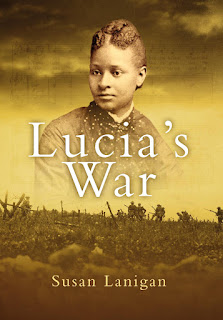Book #43
Lucia’s War by Susan Lanigan
London, 1949. Soprano Lucia Percival has overcome racism and many obstacles to become a renowned opera singer. She is now due to perform her last concert. But she has no intention of going onstage. A terrible secret from her service during the First World War has finally caught up with her.
London, 1917. Lucia, a young Jamaican exile, hopes to make it as a musician. But she is haunted by a tragic separation that is still fresh in her memory - and when she meets Lilian, an old woman damaged by a similar wartime loss, she agrees to a pact that could destroy everything she has fought so hard to achieve.From the Western Front and the mean streets of Glasgow, to black society in London, Lucia’s story tells a tale of music, motherhood, loss and redemption.
This is a stunning work of historical fiction, and I’m very grateful to have been given an advance review copy.
The title - Lucia’s War - sums up everything about this novel. It’s her experience of war, and it’s everything that happened to her during, or as a consequence of, that war. Lanigan excellently portrays how the First World War affected women left at home, how they helped, how they grieved, and how they managed the consequences.
As a young woman, Lucia travels from her homeland of Jamaica to help with the war effort, finding herself in France and, ultimately, London. Her consequences are dark and heartbreaking, and seeing how she manages these feels impossible. I was desperate for her happy ending to arrive, with Lucia battling through like a true tragic heroine, balancing personal struggles with her quest to become a famous singer.
Lucia tells her story to a music critic, and as it comes in a stream of consciousness format, we flick around through time an awful lot. I felt this was a perfect way to tell the story, with Lucia wandering off on tangents as something evoked a memory. It felt as though she were telling her story to me personally, and I was rapt.
The plot seems to have been very carefully considered, with things falling into place at perfect moments, and characters being related to each other in ways we wouldn’t have fathomed. Lanigan has a wonderful way of subtly characterising even the smallest of parts, and it leads to a deep understanding of the personalities, but most importantly for the plot, motives. Some of them carry out some disgusting deeds, and yet Lanigan’s characterisation allows us to understand their reasons, and almost, if not quite entirely, justify them.
Lanigan’s social commentary on the early 1900s is truly something to behold. She speaks a lot on racial tension, on how people of colour were perceived, the looks, the statements, the othering. It hurt to read, and yet 100 years on, it still happens. As Lucia was not only black, but a woman too, she faces double the oppression, and Lanigan takes great pains to show us the struggles of all female characters within the novel.
This was such a gorgeous account of wartime and its aftermath, of racist Britain, of a woman’s unfeasible fight to get what she wants. I’d wholeheartedly recommend it, with a warning that it will break your heart.

